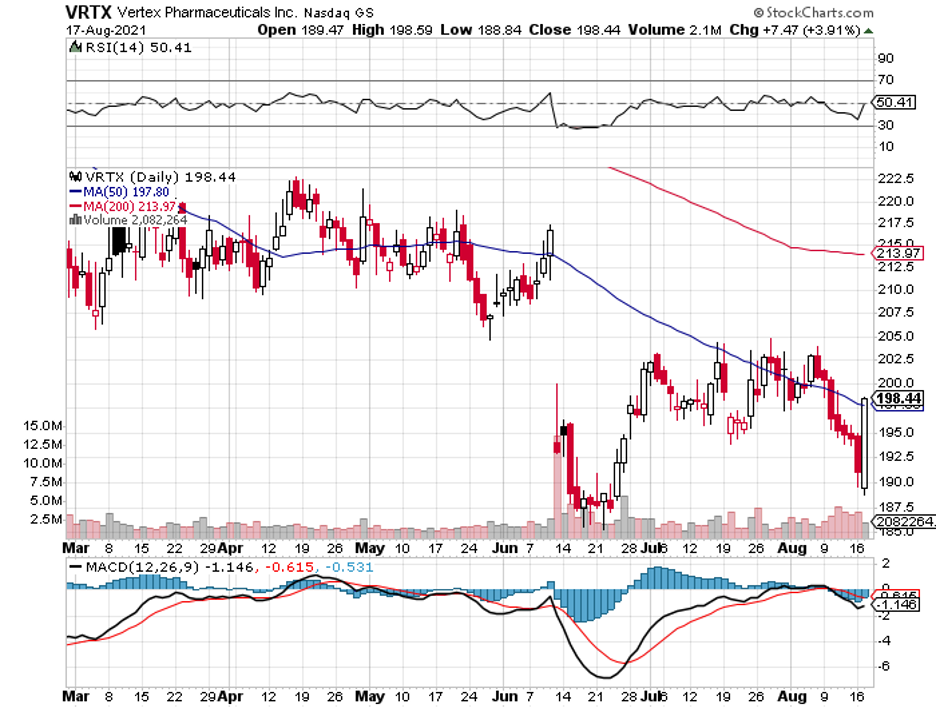A Low-Profile Biotech Winner
Choosing winners among biotechnology and healthcare stocks these days isn’t easy.
Since the year started, the sector has been marred with several unexpected disappointments like the 50% decline of crowd favorites Acadia Pharmaceuticals (ACAD) and Sarepta Therapeutics as well as the 33% fall of the ever-dependable FibroGen (FGEN).
So, how can investors pick a winner?
One tactic is taking a peek at what Wall Street analysts are doing, noting which among the companies they’re following are trading the farthest below the estimated price points.
Among the names on the list, a particular stock stands out as a strong contender these days: Vertex Pharmaceuticals (VRTX).
Although it’s one of the most widely known biotechnology companies today, Vertex actually started in a garage of a Harvard-trained chemist, Joshua Bogner, who left his cushy job at one of the most illustrious big pharma companies at that time, Merck (MRK), to pursue his vision.
The company’s raison d’être was a major selling point for a lot of talented and idealistic scientists in that era.
That is, Vertex wanted to find cures for the most challenging diseases and do this in an unbureaucratic setting.
Since then, Vertex’s goal has been straightforward: tackle the most complex and toughest diseases and deliver breakthrough treatments that offer tangible benefits to patients.
Over the years, the company has managed to keep this goal at the forefront of its efforts, starting with its work on the devastating genetic disorder called cystic fibrosis (CF).
Vertex’s work on CF took over a decade, but it eventually led to an impressive franchise that helped with the treatment of patients.
In the first quarter of 2021 alone, sales in this segment reached $1.7 billion.
Expanding on its work, Vertex has explored genetic therapies and set up a collaboration with Moderna (MRNA) in 2016.
Using the latter’s well-established expertise in messenger RNA technology, the companies are expected to come up with more aggressive and advanced CF treatments in the coming years.
Given these developments, Vertex reiterated its 2021 sales guidance to be somewhere in the range of $6.7 and $6.9 billion. Meanwhile, sales of its CF franchise are estimated to peak at $9 to $10 billion—if not higher—by 2024.
Aside from its work on CF, Vertex has also been pouring resources on developing treatments for severe sickle cell anemia and beta thalassemia, a rare blood disorder.
In fact, the company has been looking into these developments as the next major revenue stream, as seen in its bolstered collaboration deal with CRISPR Therapeutics (CRSP).
In this deal, Vertex paid the smaller biotechnology company $900 million upfront plus a potential addition of $200 million following the first regulatory approval of their therapy, CTX001.
While this may sound like a hefty deal to some, Vertex actually values CTX001 at roughly $11 billion.
CTX001, which is a one-time therapy, is priced at roughly $1 million per patient. At this point, the market for beta thalassemia is valued at $32 billion.
Needless to say, this would make CTX001 a massive income generator in the next few years.
Considering the lucrative market for beta thalassemia, though, it’s no surprise that several competitors have emerged to grab their share as well.
Some companies, such as Novartis (NVS) and Acceleron (XLRN), offer maintenance drugs for the disease.
Meanwhile, others like Protagonist Therapeutics (PTGX) and Ionis Pharmaceuticals (IONS) are attempting to develop treatments that would become direct competitors of CTX001.
However, the closest rivals of the Vertex-CRISPR candidate are from Bluebird Bio (BLUE) and Editas Medicine (EDIT).
While this has become a crowded space, Vertex and CRISPR remain the leaders in this segment, as most of the other candidates are still in the investigation phase.
Since it was founded in the 1980s, Vertex has remained true to its vision of tackling some of the toughest diseases out there.
While big pharmaceutical companies, such as AbbVie (ABBV), decided to expand their portfolio through acquisitions, Vertex leveraged its talent pool and maximized its funds by establishing strategic collaborations instead.
This tactic provided the company with enough elbow room that eventually led to its dominance in the CF space, where it now enjoys a virtual monopoly until at least the next decade.
Meanwhile, it has forged strong relationships with promising biotechnology companies and can very well be on its way to becoming the most dominant force in the rare blood disorder segment.
Overall, Vertex Pharmaceuticals is an attractive stock with an impressive portfolio and an even more impressive pipeline.


